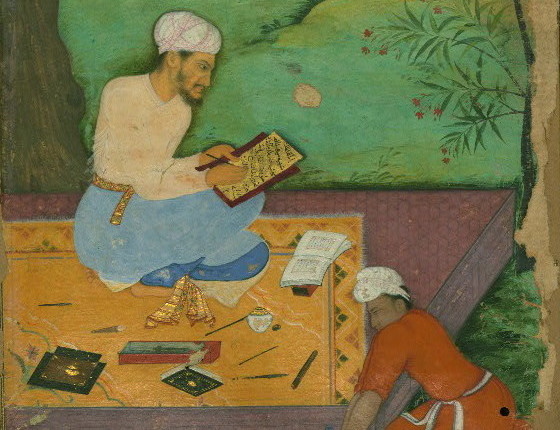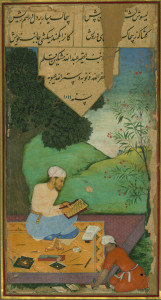
Date/Time
Friday, April 8, 2016–Saturday, April 9, 2016
All Day
Location
UCLA Royce Hall, Room 314
10745 Dickson Plaza
Please note that the Clark Library is closed for renovations.
In 2015–16 all events are being held on UCLA’s main campus.
Core Program 2015–16
The Frontiers of Persian Learning: Testing the Limits of a Eurasian Lingua Franca, 1600–1900
Conference 3: The Epistemological Frontiers of Persian Learning
—a conference organized by Nile Green, University of California, Los Angeles
and the Irving & Jean Stone Chair in Social Sciences
As a lingua franca promoted by multi-ethnic and multi-religious states and expanded further by education and commerce, Persian had reached the zenith of its geographical and social reach by the eighteenth century. In the course of the nineteenth century, it was rapidly undermined by the rise of new imperial and vernacular languages. By 1900 a language that had connected much of Eurasia had shrunk to a core ‘homeland.’ This conference series aims to understand the reasons behind both the rapid expansion and contraction of Persian by identifying what functions the language was both able and unable to serve in an age of transformative Eurasian interactions. By identifying the geographical, social, and epistemological ‘frontiers’ of Persian, these Core conferences explore the limits of exchange, understanding, and affection between the diverse communities brought into contact by Persian. Through a critical rather than celebratory approach drawn from the intersection of historical, sociolinguistic, and literary analyses, the program aims to test the limits of Persian by identifying its geographical, social, and epistemological fault lines.
While Persian has been rightly admired as a language of humanism, philosophy, and science, there is little sense of its epistemological limitations. Yet the early modern period saw a rapid acceleration of intellectual and scientific exchange, in the case of Persian involving translations from both European and Asian languages. In this age of new ideas, the third conference asks whether there were certain concepts or debates that Persian was unable to capture or communicate? Were these constraints due to external, socio-political factors, or did Persian’s linguistic profile and literary conventions impose on its users internal constraints? How constraining a factor was Persian’s reliance on manuscript transmission prior to the mid-nineteenth century (and, conversely, what was the impact on Persian of printed texts in European or vernacular languages)? What role was played by demands of creating a vocabulary for scientific discoveries and political innovations made in other cultural and linguistic contexts? In these ways, the conference charts the epistemological barriers of Persian as it responded to new political and intellectual demands.

Speakers
Muzaffar Alam, University of Chicago
Ali Anooshahr, University of California, Davis
Subah Dayal, University of California, Los Angeles
Rebecca Gould, University of Bristol
Rajeev Kinra, Northwestern University
Hajnalka Kovacs, Duke University
Paul Losensky, Indiana University
John R. Perry, University of Chicago
Sanjay Subrahmanyam, University of California, Los Angeles
Marc Toutant, Ahmanson-Getty Fellow
Image
Portrait of the scribe Mīr ʿAbd Allāh Kātib in the company of a youth burnishing paper, with the scribe holding a piece of paper giving his name, the place of copying (Allāhābād), and the date 27 Muḥarram 1011 AH (1602 CE); from Collection of Poems (divan), written by Amir Najm al-Din Hasan Dihlavi
Walters Art Museum Ms. W.650, folio 187a
Program
Friday, April 8, 2016
9:45 a.m.
Morning Coffee and Registration
10:15 a.m.
Barbara Fuchs, University of California, Los Angeles
Welcome
Nile Green, University of California, Los Angeles
Opening Remarks
10:30 a.m.
Panel 1: Mental Horizons of a Persianate Seventeenth Century
Chair: Domenico Ingenito, University of California, Los Angeles
Paul Losensky, Indiana University
“Creative Flows: The Semantics and Imagery of Fayz in Early Modern Persianate Literary Discourse”
Ali Anooshahr, University of California, Davis
“The Frontiers of Indo-Persian Historiography in 17th-Century Sindh”
Subah Dayal, University of California, Los Angeles
“Between Persian and Dakani: An Afghan Patron in Late-Seventeenth-Century Bijapur”
Discussion
12:30 p.m.
Lunch
1:45 p.m.
Panel 2: Changing Linguistic Borderlands
Chair: Arash Khazeni, Pomona College
Marc Toutant, Ahmanson-Getty Fellow
“Replacing Persian as the Main Literary Language: Policies of Turcization at the Courts of the Khiva Khanate in the 19th Century”
Rebecca Gould, University of Bristol
“Dissidence from a Distance: Mirza ‘Abd al-Rahim Talibov in Daghestan”
Discussion
3:05 p.m.
Coffee Break
3:20 p.m.
Panel 3: Moving Spaces of Global Persian
Chair: Kevan Harris, University of California, Los Angeles
Sanjay Subrahmanyam, University of California, Los Angeles
“Persian Diplomacy and Indian Ocean Frontiers: The View from the Estado da Índia”
John R. Perry, University of Chicago
“International Persian: Survival and Revival in the 20th and 21st Centuries”
Discussion
4:40 p.m.
Reception
Saturday, April 9, 2016
9:45 a.m.
Morning Coffee and Registration
10:15 a.m.
Panel 4: Epistemic Frontiers of Indo-Persian
Chair: Paul Losensky, Indiana University
Rajeev Kinra, Northwestern University
“Indo-Persian Philology at the Frontiers of Modernity: Or, Three Ways of Looking at the Farhang-i Jahāngīrī (1608)”
Hajnalka Kovacs, Duke University
“The Global Limits of ‘Localization’: Indo-Persian Literature in the Late-17th through the Late-18th Century”
11:35 a.m.
Coffee Break
11:50 a.m.
Muzaffar Alam, University of Chicago
“Persian in a Declining Empire”
Chair: Nile Green, University of California, Los Angeles
12:40 p.m.
Program concludes
Booking Form
Bookings are currently closed for this event.

